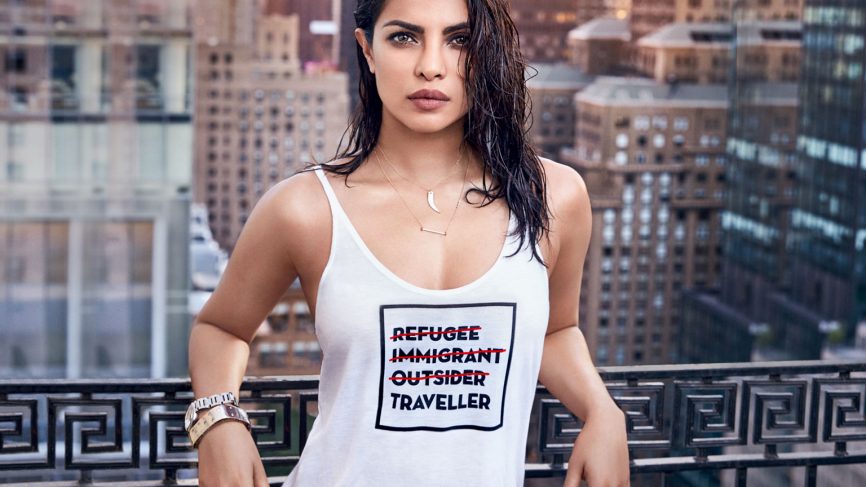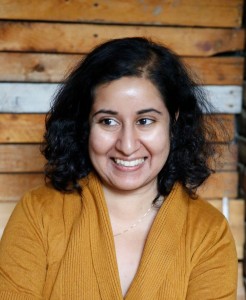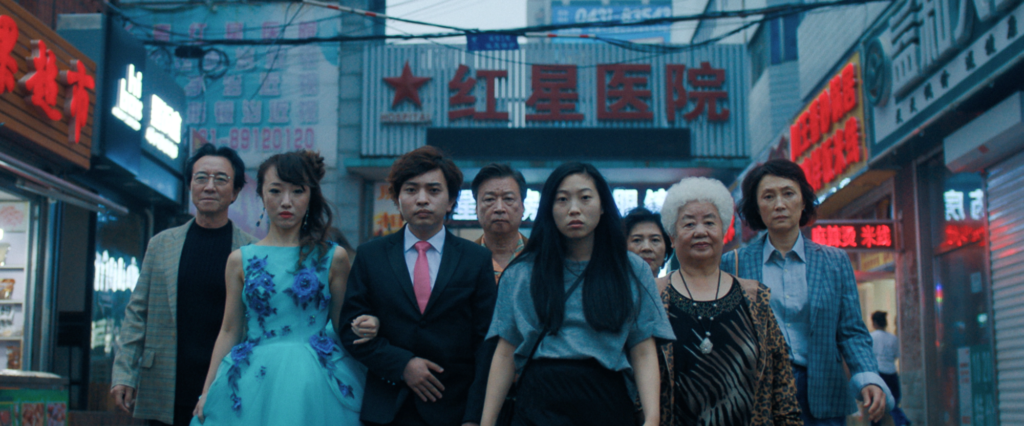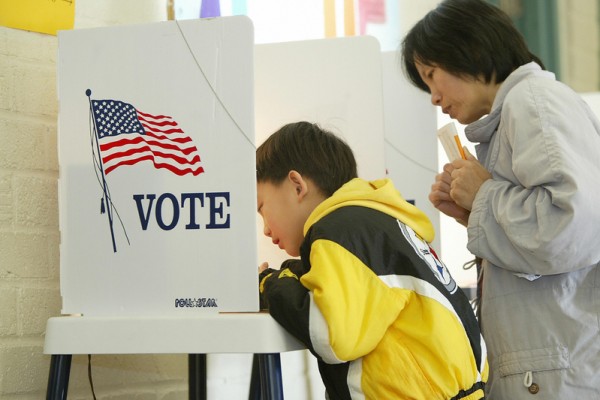
By Guest Contributors: Lakshmi Gandhi (@lakshmigandhi) and Asha Sundararaman (@mixedtck)
We really weren’t planning to talk about Priyanka Chopra so soon after our last gchat conversation. That all changed when our Twitter friend Sharanya Manivannan (pre-order her book!) pointed us towards the controversy surrounding the actress’s photo shoot for the cover of Conde Nast Traveller India. It features Chopra in tank top that’s been described as “insensitive,” “xenophobic,” and “racist” against refugees and other immigrants and we immediately knew that we had to discuss it.
Lakshmi: Since Sharanya tweeted us the image of the cover we’ve both been getting tweets from PC fans about how we are super sensitive. Want to explain to those tweeters what’s wrong with PC’s outfit?
https://twitter.com/ranyamanivannan/status/784680236122333184
Asha: Besides the fact that it equates the experience of someone freely choosing to leave their home to basically forced to, whether for safety or economics?
Lakshmi: There’s definitely that! Let’s talk to directly to Mr. Park, who tweeted: “You’re joking right? How is this racist or dehumanizing?”
You're joking right? How is this racist or dehumanizing?
— Bhagwad Park (@bhagwad) October 11, 2016
Asha: I’ll reference CN Traveller’s response, which reads in part that “our labeling of people as immigrants, refugees and outsiders is creating a culture of xenophobia.” For one thing, it’s not the labeling of people that creates xenophobia, it’s already there.
Lakshmi: Absolutely. If anyone wants to read something truly horrifying (and eye-opening) about the state of refugees in India, I recommend the Women’s Refugee Commission’s “Mean Streets” report from earlier this year. It has a whole section on women refugees in Delhi. I read this passage months ago and I still think about it.
In Delhi, woman refugees go to food markets at night to collect over-ripe or bruised vegetables, or buy them from sellers at reduced prices. This is a particular site of violence for them, because would-be attackers know their routine and can attack women either at the market or on their way home. As one woman put it, “they’re waiting for us.”
Refugee women are uniquely vulnerable. So to literally cross them out and forget about their existence means something.
Asha: They are vulnerable. Economics is huge, especially in a refugee population.
Lakshmi: In that WRC report, African women refugees in Delhi regularly mentioned being propositioned all the time by men in the street, by landlords, and by employers who would say horribly racist things and assume that they were open to sex work.
Asha: It’s also important to remember that being able to freely travel is a privilege and being able to choose to travel is a privilege.
Lakshmi: I didn’t like the CN Traveller ‘apology’ post for many reasons. One of them was that there is nothing inherently wrong with being a refugee, an immigrant, or an outsider. Why are people refugees? Because their homeland became unsafe.
Asha: There’s also this from the post:
“It’s about how we are allowing some powerful leaders to build barriers that make it more difficult for bright, motivated and hardworking people to see more of the world, learn from it and make it better for us all.”
Traveling can be prohibitively expensive and it’s not our leaders that create that barrier, it’s economics.
Lakshmi: One thing I definitely want to bring up is that it’s strange that PC’s shirt crossed out the word refugee because her co-star Yasmine Al Massri was a refugee. She grew up during the Lebanese Civil War and is of Palestinian descent. So she’s a double refugee in a way, if you go back through her family tree.
She’s obviously much less famous but her approach to fame and speaking out on current events is pretty much polar opposite to PC’s. I also love that she tweeted a photo of the day she got her American citizenship and basically said, ‘Take that, Trump!‘
Asha: She’s great!
Lakshmi: This will be her first election! And she definitely thinks about the diversity in Hollywood issue a lot, as she reveals here:
“You saw in the Emmys how Rami Malek got the Emmy for Best Actor on a TV show and he’s an Egyptian actor. I just see that I am a part of something great. I am realizing that the twins are not an accident. Me playing those two characters is not a gamble. I am a part of a revolution on TV and I think I’m a part of a revolution also in the social world environment.”
PC will never do an interview like this. It’s not her nature and she likes being in that apolitical space. But it is so nice that Yasmine does do this.
Asha: It really is. I think it’s probably because she grew up in that in between and had one foot in both worlds. She’s traveled out of force and necessity, and also because she can.
Lakshmi: It would be great for one of the CN Traveller editions to profile someone like her.
Asha: I think this is an important line and really illustrates the difference between choosing to travel and being forced to.
“I was so hurt and angry about how my right to grow up as a human being, and have rights to choose who I want to be was taken away from me.”
Lakshmi: That’s beautifully said. Gosh, I’m reading through Yasmine’s interview now and it’s making me tear up a little. Here’s what she says about the current refugee crisis and how she has a responsibility to speak out:
“I am just learning, especially since I became a mother that if I do not do something about my story, it will hunt me like a nightmare all my life. The only way I can go to bed at night and feel like I am participating in making this world better for a child is by me telling my story. It’s by me giving my voice to another child like me to tell their story.”
Asha: Yes, i love that attitude.
Lakshmi: It’s really what great art and great writing is all about.
Asha: It’s so easy to think that words don’t matter, or that labels don’t matter, and without labels everything would be fine but in reality, the conflict, the experiences, will always be there, and labeling them just allows us to make sense of the world. It gives them a shape.
Lakshmi: And not using labels like ‘refugee’ and ‘immigrant’ is — intentionally or not —a way of suppressing these communities and conversations.
This post originally appeared on The Lakshmi and Asha Show, our new weekly pop culture newsletter. You can subscribe here.

Lakshmi Gandhi is a journalist and pop culture writer based in New York. Her work has appeared in Metro New York, NBC Asian America and NPR’s Code Switch blog, among other sites. She likes it when readers tweet her @LakshmiGandhi with their thoughts on Asian American issues and romance novels.
Asha Sundararaman is a freelance writer and photographer based in Oakland, California. When she’s not discussing pop culture, she can be found in her kitchen blending the flavors of her Southern and Indian roots.
Learn more about Reappropriate’s guest contributor program and submit your own writing here.


